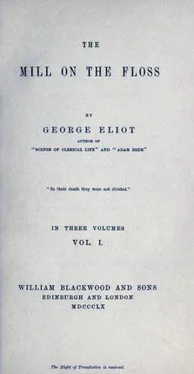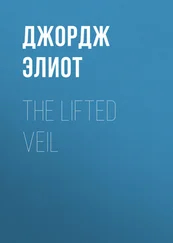"You are surprised to see me again, Miss Tulliver; I ought to apologize for coming upon you by surprise, but I wanted to come into the town, and I got our man to row me; so I thought I would bring these things from the 'Maid of Artois' for your cousin; I forgot them this morning. Will you give them to her?"
"Yes," said Maggie, who had risen confusedly with Minny in her arms, and now, not quite knowing what else to do, sat down again.
Stephen laid down his hat, with the music, which rolled on the floor, and sat down in the chair close by her. He had never done so before, and both he and Maggie were quite aware that it was an entirely new position.
"Well, you pampered minion!" said Stephen, leaning to pull the long curly ears that drooped over Maggie's arm. It was not a suggestive remark, and as the speaker did not follow it up by further development, it naturally left the conversation at a standstill. It seemed to Stephen like some action in a dream that he was obliged to do, and wonder at himself all the while, — to go on stroking Minny's head. Yet it was very pleasant; he only wished he dared look at Maggie, and that she would look at him, — let him have one long look into those deep, strange eyes of hers, and then he would be satisfied and quite reasonable after that. He thought it was becoming a sort of monomania with him, to want that long look from Maggie; and he was racking his invention continually to find out some means by which he could have it without its appearing singular and entailing subsequent embarrassment. As for Maggie, she had no distinct thought, only the sense of a presence like that of a closely hovering broad-winged bird in the darkness, for she was unable to look up, and saw nothing but Minny's black wavy coat.
But this must end some time, perhaps it ended very soon, and only seemed long, as a minute's dream does. Stephen at last sat upright sideways in his chair, leaning one hand and arm over the back and looking at Maggie. What should he say?
"We shall have a splendid sunset, I think; sha'n't you go out and see it?"
"I don't know," said Maggie. Then courageously raising her eyes and looking out of the window, "if I'm not playing cribbage with my uncle."
A pause; during which Minny is stroked again, but has sufficient insight not to be grateful for it, to growl rather.
"Do you like sitting alone?"
A rather arch look came over Maggie's face, and, just glancing at Stephen, she said, "Would it be quite civil to say've s'?"
"It was rather a dangerous question for an intruder to ask," said Stephen, delighted with that glance, and getting determined to stay for another. "But you will have more than half an hour to yourself after I am gone," he added, taking out his watch. "I know Mr. Deane never comes in till half-past seven."
Another pause, during which Maggie looked steadily out of the window, till by a great effort she moved her head to look down at Minny's back again, and said,–
"I wish Lucy had not been obliged to go out. We lose our music."
"We shall have a new voice to-morrow night," said Stephen. "Will you tell your cousin that our friend Philip Wakem is come back? I saw him as I went home."
Maggie gave a little start, — it seemed hardly more than a vibration that passed from head to foot in an instant. But the new images summoned by Philip's name dispersed half the oppressive spell she had been under. She rose from her chair with a sudden resolution, and laying Minny on his cushion, went to reach Lucy's large work-basket from its corner. Stephen was vexed and disappointed; he thought perhaps Maggie didn't like the name of Wakem to be mentioned to her in that abrupt way, for he now recalled what Lucy had told him of the family quarrel. It was of no use to stay any longer. Maggie was seating herself at the table with her work, and looking chill and proud; and he — he looked like a simpleton for having come. A gratuitous, entirely superfluous visit of that sort was sure to make a man disagreeable and ridiculous. Of course it was palpable to Maggie's thinking that he had dined hastily in his own room for the sake of setting off again and finding her alone.
A boyish state of mind for an accomplished young gentleman of five-and-twenty, not without legal knowledge! But a reference to history, perhaps, may make it not incredible.
At this moment Maggie's ball of knitting-wool rolled along the ground, and she started up to reach it. Stephen rose too, and picking up the ball, met her with a vexed, complaining look that gave his eyes quite a new expression to Maggie, whose own eyes met them as he presented the ball to her.
"Good-bye," said Stephen, in a tone that had the same beseeching discontent as his eyes. He dared not put out his hand; he thrust both hands into his tail-pockets as he spoke. Maggie thought she had perhaps been rude.
"Won't you stay?" she said timidly, not looking away, for that would have seemed rude again.
"No, thank you," said Stephen, looking still into the half-unwilling, half-fascinated eyes, as a thirsty man looks toward the track of the distant brook. "The boat is waiting for me. You'll tell your cousin?"
"Yes."
"That I brought the music, I mean?"
"Yes."
"And that Philip is come back?"
"Yes." (Maggie did not notice Philip's name this time.)
"Won't you come out a little way into the garden?" said Stephen, in a still gentler tone; but the next moment he was vexed that she did not say "No," for she moved away now toward the open window, and he was obliged to take his hat and walk by her side. But he thought of something to make him amends.
"Do take my arm," he said, in a low tone, as if it were a secret.
There is something strangely winning to most women in that offer of the firm arm; the help is not wanted physically at that moment, but the sense of help, the presence of strength that is outside them and yet theirs, meets a continual want of the imagination. Either on that ground or some other, Maggie took the arm. And they walked together round the grassplot and under the drooping green of the laburnums, in the same dim, dreamy state as they had been in a quarter of an hour before; only that Stephen had had the look he longed for, without yet perceiving in himself the symptoms of returning reasonableness, and Maggie had darting thoughts across the dimness, — how came he to be there? Why had she come out? Not a word was spoken. If it had been, each would have been less intensely conscious of the other.
"Take care of this step," said Stephen at last.
"Oh, I will go in now," said Maggie, feeling that the step had come like a rescue. "Good-evening."
In an instant she had withdrawn her arm, and was running back to the house. She did not reflect that this sudden action would only add to the embarrassing recollections of the last half-hour. She had no thought left for that. She only threw herself into the low arm-chair, and burst into tears.
"Oh, Philip, Philip, I wish we were together again — so quietly — in the Red Deeps."
Stephen looked after her a moment, then went on to the boat, and was soon landed at the wharf. He spent the evening in the billiard-room, smoking one cigar after another, and losing "lives" at pool. But he would not leave off. He was determined not to think, — not to admit any more distinct remembrance than was urged upon him by the perpetual presence of Maggie. He was looking at her, and she was on his arm.
But there came the necessity of walking home in the cool starlight, and with it the necessity of cursing his own folly, and bitterly determining that he would never trust himself alone with Maggie again. It was all madness; he was in love, thoroughly attached to Lucy, and engaged, — engaged as strongly as an honorable man need be. He wished he had never seen this Maggie Tulliver, to be thrown into a fever by her in this way; she would make a sweet, strange, troublesome, adorable wife to some man or other, but he would never have chosen her himself. Did she feel as he did? He hoped she did — not. He ought not to have gone. He would master himself in future. He would make himself disagreeable to her, quarrel with her perhaps. Quarrel with her? Was it possible to quarrel with a creature who had such eyes, — defying and deprecating, contradicting and clinging, imperious and beseeching, — full of delicious opposites? To see such a creature subdued by love for one would be a lot worth having — to another man.
Читать дальше












